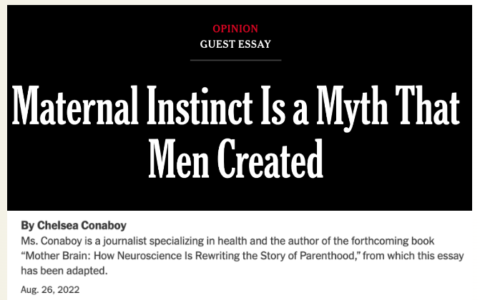Jerry Coyne responds to a New York Times op-ed by Chelsea Conaboy (author of a forthcoming book from which the op-ed was adapted):
The recent article […] from the New York Times (of course), is one of the worst of the lot. It bespeaks a lack of judgment on the part of the author — who ignores biology because of her ideology — as well as on the part of the newspaper, which failed to hold the author’s feet to the scientific fire. Let this post be my rebuttal.
Author Conaboy, who apparently hasn’t done enough scientific research, maintains that “maternal instinct” doesn’t exist, but is a social construct devised by men to keep women subordinate.
The immediate problem is that Conaboy never defines “maternal instinct”. It could mean any number of things, including a greater desire of women than men to have children, a greater desire of women than of men to care for those offspring, the fact that in animals mothers spend more time caring for offspring than do fathers, a greater emotional affinity of women than of men towards children (including offspring), or the demonstration of such a mental difference by observing a difference in caring behavior.
I will define “maternal instinct” as not only the greater average tendency of females than males to care for offspring, but also a greater behavioral affinity towards offspring in females than in males. The term involves behavioral response, not “feelings”, which are demonstrable only in humans. Thus one can look for difference in “parental instincts” across various species of animals.
But even in this sense, Conoboy is partly (but far from wholly) correct when she discusses humans. It’s undoubtedly true that women were socialized into the sex role as offspring breeders and caretakers, with men assuming the “breadwinning” role. It’s also true that women were often denied access to work or education because their vocation was seen as “reproducer”, or out of fear that they would spend less time working and more on children, or even that they’d get pregnant and would leave jobs. Further, it’s also true that this role difference was justified by being seen as “hard-wired” (i.e., largely the result of genes, which, I argue below, is true), and that “hard-wired” was conceived as “unable to be changed”. The latter construal, however, is wrong, and that is what really held back women. The socialization of sex roles, which still occurs, goes on from early ages, with girls given dolls and boys toy cars, though, as society has matured, we’re increasingly allowing girls to choose their own toys and their own path through life. I of course applaud such “equal opportunity”.
But to claim that women don’t have a greater desire than men to care for offspring, or have a greater emotional affinity towards offspring, is to deny biology, and evolution in particular. (I freely admit that many men love their kids deeply, and that some men care for them as much or more as do mothers, but I’m talking about averages here, not anecdotes.)
There are two reasons why Conaboy is wrong, and both involve evolution.
The first is theoretical, but derived from empirical observations. It thus explains the second, which is wholly empirical and predictive. How do we explain the fact that, across the animal kingdom, when members of only one sex do most of the childrearing, it’s almost invariably the females? (Yes, in many species males share the duties, and in a very few, like seahorses, males provide more parental care; and there are evolutionary reasons for that.)
The reasons for the statement in bold above involves the biology of reproduction. It is the female who must lay the eggs or give birth, and there is no way she can leave her genes behind unless she does that. It’s easier for males to take off after insemination and let the females care for offspring. Given that females are constrained to stick with the fertilized eggs, their best strategy is to take care of the gestation and resultant offspring, which of course allows males to seek other mates. Not only must females carry the fetuses, lay the eggs, and so on, but they are also constrained to see out the pregnancy until offspring are produced and then suckle or tend them in other ways. In some cases it’s the best evolutionary strategy for a male to stick around and share the child-rearing, but often it’s not.
This disparity in behavior holds not just in humans, of course, but in many animals: it’s a prediction — largely verified — of evolutionary psychology.




